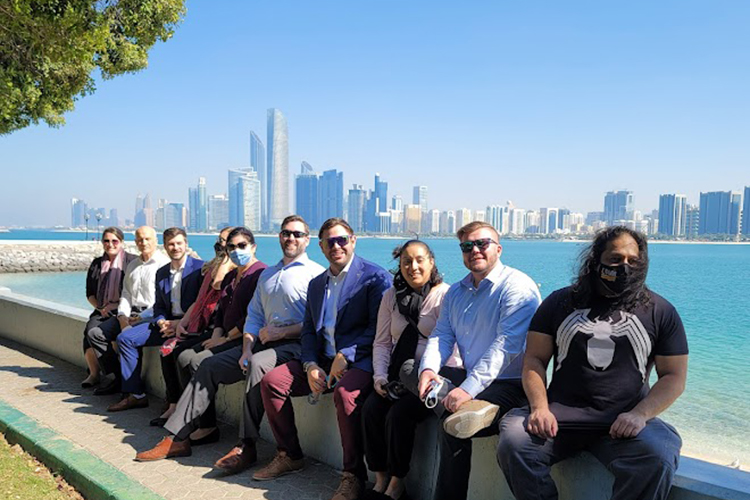Many Americans automatically associate the Middle East with oil, camels, and political turmoil. This stereotype, however, was dispelled for the Executive MBA cohort that boarded an Emirates Air flight from Chicago to Dubai in January for a 10-day study trip in the United Arab Emirates (UAE).
Student Erin Ortiz comments on the trip’s significance: “I now know from experience how diverse and international the UAE population is. I’ve seen an oil-rich country create sustainable cities and promote international business and tourism. I better understand business in the region because I’ve talked to local business professionals in the region.”
Adam Wickersham, Director of Master’s Programs, who organized and led the trip, explains that the UAE’s many free trade zones, its ports and shoreline, and its proximity to Asia, Africa, and Europe make it an international center of commerce. In fact, according to Bloomberg Businessweek, in 2020 only eight percent of the UAE’s residents were native-born. The other 92 percent were expatriates from around the world.
“If companies are not doing business there, they will be soon,” Wickersham predicts, noting the UAE’s tremendous economic growth over the last decade.
In Dubai, the group toured the Jebel Ali Free Zone, or JAFZA, one of the world’s largest free trade zones and busiest ports. There they learned first-hand from the port director about how more than 7,200 companies, including Harley Davidson, Emerson, and Rockwell Automation take advantage of tax-free opportunities and easy access to airports, railways, and shipping to conduct operations there.
Students also applied their analytical and strategic planning skills to real-world scenarios during a briefing with executives from Doka, the world’s largest concrete forms manufacturer. Company leadership presented the students with a challenge: provide a strategy to help Doka gain two percent market share.
To accomplish this, students met in small groups with Doka staff to gather information. They then applied tools from their coursework to recommend strategies for growth. Doka executives were intrigued and delighted by the students’ suggestions. Ortiz comments, “Not only were they impressed with the quality of the insights and considered them viable strategies, they also wrote down some of our recommendations and engaged in a dialogue about how they could implement them into their business.”
While the group met with many corporate executives, government officials, and entrepreneurs, they also experienced the local business climate in less traditional ways. One trip highlight was the local market immersion scavenger hunt. Working in teams of three (each accompanied by a local guide), students navigated the local public transit system and explored different types of retail developments, where they collected observations about the people, products, and the overall shopping experiences.
Each team’s hunt ended in an old souq, or market, where, as student Sharif Hoque explains, “Negotiating is an established practice.” Students bargained over prices on goods such as coconuts, scarves, and jewelry and enjoyed the bustle of these traditional bazaars.
In addition to its commercial importance, the UAE is known for expanding its use of clean energy sources. This is showcased at Expo 2020 (pushed back a year to the pandemic), the current World Expo in Dubai. Wickersham explains how Expo 2020 relies heavily on solar energy that is harvested in an “artistically pleasing way.” While the energy “trees” around the park provide shade to the surrounding attractions, their canopies and branches can produce enough energy to power 900,000 cell phones, according to the official website.
The Expo, however, was impressive for many other reasons. This latest world’s fair features exhibits, demonstrations, restaurants, and shops sponsored by more than 190 nations, large and small, to show their accomplishments, technological advances, and cultural highlights. Students were introduced to diverse products such as Yemeni honey, Turkish coffee, and traditional New Zealand cuisine, and they interacted with people from cultures around the world, an experience Hoque describes as “life changing.”
When asked what made this trip memorable, Wickersham points out the “awakening” students experienced by visiting a place most of them knew very little about beforehand.
Michael Palm, Instructor of International Business, who also accompanied the students, echoes this sentiment and summarizes the trip’s impact with a quote from Mark Twain: ”Travel is fatal to prejudice, bigotry and narrow-mindedness, and many of our people need it sorely on these accounts. Broad, wholesome, charitable views of people and things can’t be acquired by vegetating in one little corner of the earth all one’s lifetime.”
— Melanie Michael
